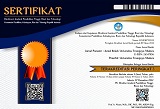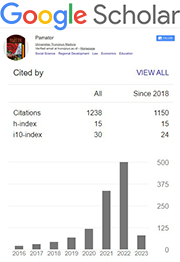Tourism And Conflict : The Empirical Study Of Sipin Lake Development, Jambi City
Abstract
The purpose of this paper is to analyze the causes of conflict and propose alternative conflict resolution in tourism development. Although this sector experienced a significant growth and was able to encourage economic growth at various levels, its management faces governance challenges for instance conflicts of interest that occur in the Sipin lake area. This area constructed in 2017 which is designated as a tourist area based on regional regulations spatial plan of Jambi city. The data is obtained from various field information through in-depth interviews, observations and various sources which then it is systematically coded to find the meaning behind the phenomena that occur. This paper reveals that conflict in development of tourism objects is triggered by the planning and implementing non-participatory regional development and differences in orientation among the actors involved. The management of an area of ± 161 ha is not maximum managed, and this can be seen from the management of the area that is not well-organized and untidy. This paper underlines that tourism conflicts can occur due to various things that result in poor tourism management so that the potential to reduce the number of visitors.
Keywords
Full Text:
PDFReferences
Afala, L. M. (2017). Menalar dinamika konflik wisata Goa Pindul. Journal of Governance, 2(1), 18–35.
Almeida, J., Costa, C., & Silva, F. N. da. (2017). A framework for conflict analysis in spatial planning for tourism. Tourism Management Perspectives, 24, 94–106. https://doi.org/10.1016/j.tmp.2017.07.021
Ansell, C., & Gash, A. (2007). Collaborative governance in theory and practice. Journal of Public Administration Research and Theory, 18, 543–571. https://doi.org/10.1093/jopart/mum032
Asikin, Z. (2014). Penyelesaian konflik pertanahan pada kawasan pariwisata Lombok (Studi kasus tanah terlantar di Gili Trawangan Lombok). Jurnal Dinamika Hukum, 14(2), 239–249. https://doi.org/10.20884/1.jdh.2014.14.2.293
Barbhuiya, M. R., & Chatterjee, D. (2020). Vulnerability and resilience of the tourism sector in India: Effects of natural disasters and internal conflict. Tourism Management Perspectives. https://doi.org/10.1016/j.tmp.2019.100616
Becken, S., & Carmignani, F. (2016). Does tourism lead to peace? Annals of Tourism Research, 61, 63–79. https://doi.org/10.1016/j.annals.2016.09.002
Cazan, I.-C. (2018). Community participation in tourism destination development: a literature review. In C. Năstase (Ed.), The 14th Economic International Conference: Strategies and Development Policies of Territories: International, Country, Region, City, Location Challenges (pp. 219–228). Iasi, Romania: LUMEN Proceedings. https://doi.org/https://doi.org/10.18662/lumproc.75
Corbetta, P. (2011). Social Research: Theory, Methods and Techniques. In Social Research: Theory, Methods and Techniques. https://doi.org/10.4135/9781849209922
Corbin, J., & Strauss, A. (2015). Basic of qualitative research: techniques and procedures for developing grounded theory (Fourth Edi). SAGE Publications.
Curcija, M., Breakey, N., & Driml, S. (2019). Development of a conflict management model as a tool for improved project outcomes in community based tourism. Tourism Management, 70, 341–354. https://doi.org/10.1016/j.tourman.2018.08.016
Giampiccoli, A., & Saayman, M. (2018). Community-based tourism development model and community participation. African Journal of Hospitality, Tourism and Leisure, 7(4), 1–27.
Islam, M. W., Ruhanen, L., & Ritchie, B. W. (2017). Adaptive co-management: a novel approach to tourism destination governance? Journal of Hospitality and Tourism Management, xxx, 1–10. https://doi.org/10.1016/j.jhtm.2017.10.009
Ismail, R., Saputra, J., & Rosli, N. (2019). The impact of top-down policy changes on socioeconomic status of orang asli. Opcion.
Iverson, T. J. (2010). Cultural conflict: Tourists versus tourists in Bali, Indonesia. International Journal of Culture, Tourism and Hospitality Research, 4(4), 299–310. https://doi.org/10.1108/17506181011081488
Kompas. (2019, September). Pariwisata berdaya saing. Kompas, 13.
Korstanje, M. E., & Clayton, A. (2012). Tourism and terrorism: Conflicts and commonalities. Worldwide Hospitality and Tourism Themes, 4(1), 8–25. https://doi.org/10.1108/17554211211198552
Lee, T. J., Riley, M., & Hampton, M. P. (2010). Conflict and progress: Tourism development in Korea. Annals of Tourism Research, 37(2), 355–376. https://doi.org/10.1016/j.annals.2009.10.001
Leedy, P. d., & Ormrod, J. E. (2016). Practical Research Planning and design (eleventh). Pearson.
Liu, P., & Ravenscroft, N. (2017). Collective action in implementing top-down land policy: The case of Chengdu, China. Land Use Policy. https://doi.org/10.1016/j.landusepol.2017.03.031
Mak, B. K. L., Cheung, L. T. O., & Hui, D. L. H. (2017). Community participation in the decision-making process for sustainable tourism development in rural areas of Hong Kong , China. Sustainability, 9, 1–13. https://doi.org/10.3390/su9101695
McKercher, B. (1992). Tourism as a conflicting land use. Annals of Tourism Research, 19(3), 467–481. https://doi.org/10.1016/0160-7383(92)90131-8
Muraya, P. W. K. (2006). Failed top-down policies in housing: The cases of Nairobi and Santo Domingo. Cities. https://doi.org/10.1016/j.cities.2005.08.002
Philips, L. P., Szuster, B. W., & Needham, M. D. (2019). Tourist value orientations and conflicts at a marine protected area in Hawaii. International Journal of Tourism Research, 21(6), 1–14. https://doi.org/10.1002/jtr.2311
Postma, A., & Schmuecker, D. (2017). Understanding and overcoming negative impacts of tourism in city destinations: conceptual model and strategic framework. Journal of Tourism Futures, 3(2), 144–156. https://doi.org/10.1108/JTF-04-2017-0022
Pülzl, H., & Treib, O. (2017). Implementing public policy. In Handbook of Public Policy Analysis: Theory, Politics, and Methods. https://doi.org/10.4324/9781315093192-14
Sari, I. P., Raden, J., Pagar, F., Bengkulu, D., Regency, W., & Park, N. (2017). Konflik kepentingan dalam pengembangan pariwisata: kasus Pulau Kapota, Wakatobi, Sulawesi Tenggara. Tsaqofah & Tarikh.
Sithirith, M. (2014). The patron-client system and its effect on resources management in Cambodia: A case in the Tonle Sap Lake. Asian Politics and Policy, 6(4), 595–609. https://doi.org/10.1111/aspp.12135
Solstrand, M. V. (2015). Institutional challenges for effective governance of consumptive wildlife tourism: case studies of marine angling tourism in Iceland and Norway. Maritime Studies, 14(4), 1–27. https://doi.org/10.1186/s40152-015-0021-1
Sugiyono. (2018). Metode penelitian kuantitatif, kualitatif, dan R&D. Alfabeta.
Thommandru, A., Espinoza-Maguiña, M., Ramirez-Asis, E., Ray, S., Naved, M., & Guzman-Avalos, M. (2021). Role of tourism and hospitality business in economic development. Materials Today: Proceedings. https://doi.org/10.1016/J.MATPR.2021.07.059
Wang, L. (2021). Causal analysis of conflict in tourism in rural China: The peasant perspective. Tourism Management Perspectives, 39, 100863. https://doi.org/10.1016/J.TMP.2021.100863
Wang, L., & Yotsumoto, Y. (2019). Conflict in tourism development in rural China. Tourism Management, 70, 188–200. https://doi.org/10.1016/j.tourman.2018.08.012
Yusrizal, F., & Yoga Asmoro, A. (2020). Dampak Sosial Budaya Pariwisata: Masyarakat Majemuk, Konflik dan Integrasi Sosial di Yogyakarta. Jurnal Pariwisata.
Zhang, Y., Lee, T. J., & Xiong, Y. (2019). A conflict resolution model for sustainable heritage tourism. International Journal of Tourism Research, 21(4), 478–492. https://doi.org/10.1002/jtr.2276
DOI: https://doi.org/10.21107/pamator.v16i1.19603
Refbacks
- There are currently no refbacks.
Copyright (c) 2023 M. Yusuf M. Yusuf, Faizah Bafadhal, Maratun Saadah

This work is licensed under a Creative Commons Attribution-ShareAlike 4.0 International License.
Jurnal Pamator : Jurnal Ilmiah Universitas Trunojoyo by Universitas Trunojoyo Madura is licensed under a Creative Commons Attribution-ShareAlike 4.0 International License.















.png)